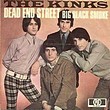|
|

From head to heart Following our retroscope series going on for several years, here we go again. Yes, for one more year! Here's Speakers' corner's cousin; From head to heart. Luna Kafé's focused eye on great events, fantastic happenings, absolute milestones, or other curious incidents from the historic shelves'n'vaults of pop'n'rock. Blowing our ears and our head, punching our chest and shaking our heart, or simply tapping our shoulder. Making us go sentimental, but not slaphappy. This moonth we'll zoom in on a 50-year-old, back to the streets of London. To swinging London. To the most dedicated followers of fashion. On a party line. Lazing on a sunny afternoon. Telling tails of drunkenness and cruelty. The elves and gnomes were hunched in fear, too terrified to cry. Everybody felt the rain. Fancy, if you believe in what I believe in, then we'll be the same, always. Little miss queen of darkness, dances sadly on. How's your brand, new limousine, twenty-four inch TV screen? Did you like prosperity, more than you liked poverty? Life is easier, so much easier... They were... not like everybody else. La-la-la-la-la..
In the summer of 1966, England won the football World Cup and The Kinks fared high on the hit lists with "Sunny Afternoon". Although the main character of the song, a representative of the ruling classes (like "A Well Respected Man" the previous year), had his problems ('My girlfriend's run off with my car, and gone back to her Ma and Pa, telling tales of drunkenness and cruelty') he could still sit down and enjoy the sun and his ice cold beer. By autumn, sociology-writer Ray Davies went deep into the grey-dull problems of the struggling classes of the United Kingdom. There's no hope, but the melody is still pretty merry. As with the previous singles and most memorable Kinks classics from the 1965-66 era, the tune draws heavily on the English music hall tradition, with a shout-along-friendly chorus, honky-tonk piano played by Ray himself and not least a trombone that starts out rather melancholic but turns more playful and jazzy towards the end. In an interview in the music weekly Melody Maker in May 1966, Ray had said that on the single after "Sunny Afternoon" he'd want to use brass and a rotten trad sound. He was probably referring to "Dead End Street" that was half-written at this point. The song marked the start of a new development of The Kinks' sound, culminating with the band hiring a brass trio for their recordings and gigs in the 1971-74 period. There's a crack up in the ceiling, What are we living for? We are strictly second class, Dead end street (yeah) The song was recorded during two sessions on 21st October 1966. The first under supervision by producer Shel Talmy with a jazz pianist and a French horn player called Albert Hall (yes, it was his real name, an amazing one for a musician living in London ...). Later the same day the four band members gave it a go on their own. It was this version that finally made it to the single. The story goes that the Kinks' members went to a pub nearby the studio where a brass band was playing. They persuaded the trombone player, called John Matthews or John Marshall, to come with them to the studio. He added his trombone part in one take, in time for one more pint before the pub closed. Ray Davies: 'I wanted 'Dead End Street' to be a bit dour and a bit earthy and a bit working-class, and the trombone fitted beautifully. Also it was more of a stomp. The version Shel wanted to make was more like a pop beat version. He finished the track and said, 'That's great,' and went home. Then we pretended to leave but came back to the studio and re-recorded the song. We played it to him the next day and he said, 'See what I mean, there's nothing wrong with it.' He thought we were playing him his version.' (Taken from the book Isle of Noises: Conversations with great British songwriters by Daniel Rachel, Pan Macmillan, 2014.) On a cold and frosty morning, What are we living for? We both want to work so hard, After a gig on 3. May 1966, Kinks bass player Pete Quaife and roadie Jonah Jones were hurt in a car crash with the band's equipment van. They were both sent to hospital, Pete with a broken foot and head bruises. John Dalton (ex-The Mark Four, that soon changed the name to The Creation after John had left and gained some success, not least in hindsight; a record company founded in the 1980s was named after them) was hired as his substitute. By September Pete announced that he wanted to leave The Kinks permanently to live with his girlfriend in Copenhagen, and John got the job as the full-time bass player of The Kinks. It didn't last long though. When Pete returned to London by November he was persuaded to re-join the band. However, it is John Dalton who handles the bass on "Big Black Smoke" and one of the two basses on "Dead End Street", the other played by Ray. Afterwards he was fired and forced to work as a coalman for a living for a while. He returned two and a half years later and stayed for several years when Pete left The Kinks permanently in 1969, but that's another story. Soon after Pete returned (we're back in the autumn 1966 now), The Kinks made a promotion film for the forthcoming single, in black and white, where they act as undertakers carrying a coffin round the dull grey back streets of Camden, North London. Little brother and main guitarist Dave Davies double acts as the grieving widow, Ray as an old lady, Pete as the cruel landlord, Dave (again!) and drummer Mick Avory as his assistant, while Kinks roadie Stan Whitley takes the role as the corpse, who breaks free from the coffin and runs away while the band members/undertakers have a smoke. The film was considered too macabre to be aired by The BBC. Anyway, it was one of the very first examples of a promo film or video to a pop song apart from straight live appearances and lip-synched performances in television shows. I think the B-side of the single, "Big Black Smoke" ought to have gained the same classic status as the A-side, another story about a dreary and dull faith. It's a tight little pop-rocker, without any traces of music hall. She was sick and tired of country life. Frailest, purest girl the world has seen, The single was released on 18. November 66, only three weeks after The Kinks' fourth and first properly recorded studio album Face To Face had been released. None of the single tracks were included on the LP. The single was a moderate success, that made it to no. 5 in the British charts, but it was probably much too English to make substantial stir in the USA. Well, she slept in caffs and coffee bars and bowling alleys, She took all her pretty coloured clothes, In the big black smoke. The purple hearts Ray is singing about, were prescribed pills that included amphetamine, very popular among British housewives in the 1960s, and also among the mods of that era. Check out Franc Roddam's 1979 mod film Quadrophenia starring Phil Daniels, a young Sting and an even younger Toyah Willcox for further information. The church bells at the start and end of the song are certainly not happy wedding bells. They seems to fit closer to the undertaker's theme of the promotional film for the single's A-side. Copyright © 2016 JP
|
| You may also want to check out our Kinks articles/reviews: At The BBC, Face to Face, See My Friends, Something Else, State of Confusion, You Really Got Me. |
| © 2016 Luna Kafé |
 The Kinks
The Kinks